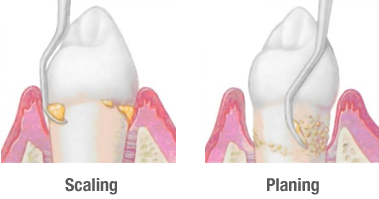Scaling & Root Planning
SCALING AND ROOT PLANING
WHAT IS DENTAL SCALING AND ROOT PLANING?
Dental scaling and root planning, also known as deep cleaning, are procedures that help treat gum disease, they are more intense than a typical dental cleaning.
Both procedures are important parts of maintaining good oral health.
WHY ARE DENTAL SCALING AND ROOT PLANING IMPORTANT?
- Help get rid of plaque: Scaling and root planing can get rid of most plaque, reducing gum inflammation, and gum disease.
- Prevent further damage: When gum disease progresses it can be very risky because bacteria can enter your bloodstream, scaling and root planing stops the progression of gum disease.
- Lessens the severity of surgery: When gum disease is too severe, periodontal surgery is needed, but scaling and root planning lessens the invasion of the surgery.

WHEN ARE DENTAL SCALING AND ROOT PLANING NECESSARY?
If gum disease begins to form, the tissue that is placed tightly around the teeth and keeps dental plaque out, begins to loosen. Healthy gums attach to your teeth from 1-3 millimeters below the gum line. With gum disease present you will develop deeper pockets to grow between your teeth and gums, therefore, causing more bacteria to gather and grow in those spaces; where toothbrush can’t reach, worsening your problems and causing uncomfortable symptoms like bad breath.
Your dentist will recommend teeth scaling and root planing if your mouth has signs of gum disease and pockets of 4 millimeters or more.
If gum disease is left untreated it can cause:
- Bleeding gums
- Inflamed gums
- Bad breath (halitosis)
- Bone and tissue loss
- Loose teeth
- Tooth loss
WHO PERFORMS SCALING AND ROOT PLANING?
Scaling and root planing are procedures performed by a dental hygienist, general dentist or periodontist (gum and bone disease specialist). Cases of early stage gum disease can be perfectly treated by dental hygienists or general dentists.
But, if the condition is too advanced it may be necessary for the dental professional to refer treatment to the periodontist; who in this case would be the suitable specialist for further treatment methods like periodontal surgery to remove plaque (when scaling and root planing are not giving satisfactory results).
HOW IS THE PROCEDURE OF DENTAL SCALING AND ROOT PLANING?
Prior to your treatment, the dental professional will perform a full evaluation of your teeth and gum’s health. This exam includes medical and dental history, x-rays, clinical intra-oral evaluation. The dentist will measure spaces between your teeth and gums, this space should measure 1-3 millimeters. With gum disease present, pockets of more than 3 millimeters begin to form in these spaces, where food and bacteria will come together.
Scaling and root planing are performed when pockets are greater than 3 mm:
- Dental anesthetics is not always necessary, but if you are nervous about discomfort or pain, talk to your dentist.
- Teeth scaling is conducted first, removing plaque from your teeth and any deep pocket.
- Root planing is carried out; the dentist will smooth the root’s surfaces making it easier for gum to reattach to teeth.
- Sometimes the dentist will recommend additional treatment like antibiotics or antimicrobial agents for mouthwash.
- In many cases it is so extensive, that it must be done in stages, it may require multiple appointments to complete in order to ensure you are as comfortable as possible during the procedure.
WHAT POST-OPERATIVE CARES SHOULD I TAKE?
- You should resume normal oral hygiene procedures after scaling and root planing
- Brush your teeth at least twice a day and floss every day.
- Maintain a healthy diet
- See your dentist for follow-up appointments in order to see If the procedure worked and that you haven’t developed any complication like infections.
WHAT ARE THE POSSIBLE COMPLICATIONS OF SCALING AND ROOT PLANING?
The possible complications are minimal. You may be at risk of infection after the procedure, so your dentist may prescribe an antibiotic or special mouthwash to use for a few days.
You may also experience pain and tenderness in gums for a few days following the procedure.
